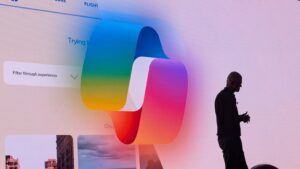Microsoft Celebrates 50 Years by Enhancing Copilot Actions to Compete in the AI Landscape

Microsoft Turns 50: Enhancing AI with Copilot Actions
As Microsoft celebrates its 50th anniversary, the tech giant is making significant strides in artificial intelligence (AI). The company’s latest developments focus on enhancing productivity through innovative features like Copilot Actions. This article explores Microsoft’s journey, its Copilot technology, and the impact of these advancements.
A Brief History of Microsoft
Founded in 1975 by Bill Gates and Paul Allen, Microsoft started as a small software company. Over the decades, it has grown into one of the biggest technology firms in the world. The company is known for products such as:
- Windows Operating System: Dominating the desktop market.
- Microsoft Office Suite: A staple in business and education for document creation and management.
- Azure Cloud Services: Competing with Amazon Web Services to dominate the cloud market.
Now, at 50, Microsoft continues to innovate, focusing particularly on integrating AI into its platform.
What are Copilot Actions?
Copilot Actions is part of Microsoft’s suite of AI tools designed to assist users in various applications. It aims to simplify tasks, improve efficiency, and enhance collaboration. Among the key features are:
Key Features of Copilot Actions
Natural Language Processing: Users can interact with applications using conversational language, making it easier to execute commands without navigating complex menus.
Contextual Assistance: Copilot features will analyze the current task and provide relevant suggestions, streamlining workflows.
Integration with Existing Tools: Built into popular Microsoft tools like Word, Excel, and Teams, Copilot Actions enhances user experience without needing extensive training.
- Real-Time Collaboration: It facilitates collaboration by allowing multiple users to work on documents simultaneously, with AI suggesting improvements or edits.
Benefits of Copilot Actions
- Increased Productivity: By automating repetitive tasks and providing instant suggestions, users can focus on more critical aspects of their work.
- User-Friendly Experience: The simplicity of interacting through natural language makes it accessible to users with varying levels of technical expertise.
- Enhanced Creativity: Copilot can help brainstorm ideas, making it valuable for content creation and project planning.
Microsoft’s AI Strategy
Microsoft is not new to AI. The company has been investing heavily in artificial intelligence across various sectors. Key aspects of its AI strategy include:
Investments in AI Research
- Partnerships: Collaborating with leading research institutions to drive innovation.
- Acquisitions: Acquiring startups specializing in AI technologies to enhance their capabilities.
Industry Applications
Microsoft leverages AI across multiple industries by offering solutions aimed at:
- Healthcare: Utilizing AI for data analysis, improving patient care, and streamlining administrative tasks.
- Finance: Automating fraud detection systems and enhancing customer service through chatbots.
- Education: Creating personalized learning experiences using AI-driven insights.
Commitment to Ethical AI
Microsoft emphasizes responsible AI use. The company is committed to developing AI technologies that prioritize:
- Fairness: Ensuring that AI models do not propagate bias.
- Privacy: Protecting user data and maintaining confidentiality.
- Transparency: Making AI systems understandable and explainable to users.
Future of Microsoft in AI
Looking ahead, Microsoft aims to remain at the forefront of AI technology. By continually refining and expanding Copilot Actions and other AI features, the company seeks to set new standards in productivity and collaboration.
Microsoft’s 50 years of experience in the tech industry, combined with its focus on AI advancements, positions the company as a key player in the evolving technological landscape. This approach not only benefits Microsoft’s products but also significantly enhances user experiences across the globe.
With these ongoing innovations, Microsoft is not just celebrating its past but actively shaping the future of work and technology.





